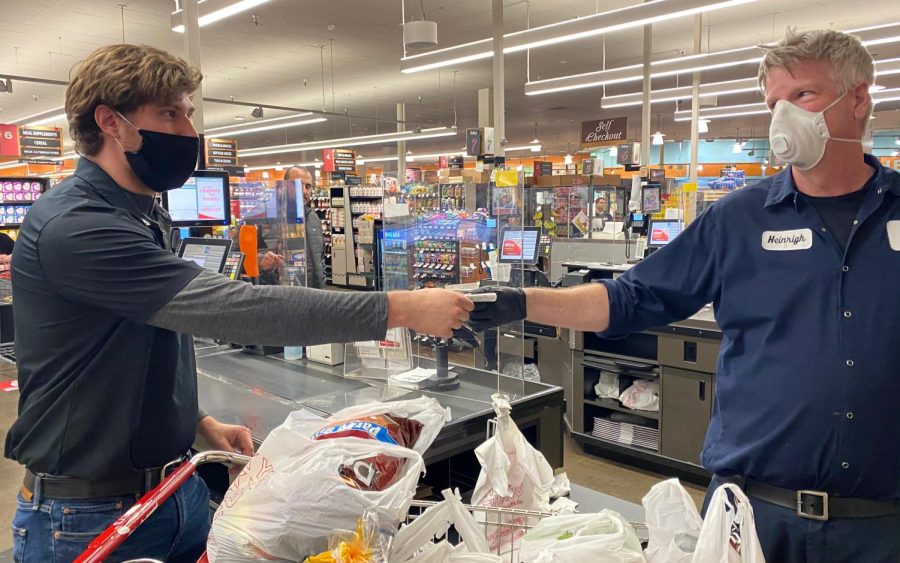The sweat dripped from my forehead and down past my mask. My legs ached and my arms were sore from swiping items across the scanner and repeatedly sanitizing the checkstand with a rag.
Everyday from the start of the Sonoma County quarantine has felt like a repetitive dream. I don’t remember how I got there, but I’m in the middle of something, and I can’t get out.
I looked down the aisle to see dozens of customers with overflowing carts waiting in my line. Through the quarter-inch plastic glass I noticed what I assumed was the smile of an older man beneath his mask. He wore a San Francisco Giants hat, glasses perched on his nose and a shirt that read “breathe, practice, repeat.”
“Thank you for being here,” the man said. “Seriously, I know it’s not easy, but I appreciate all you do.”
The single memory of this nice man is etched in my head, because he helped me understand how important it was to be doing my work and how real this emergency was. Although the stress and exhaustion I’ve experienced is also real, I often wish it was a dream.
My name is Luke Morrow and I am a 25-year-old front-line grocery clerk at a grocery store chain in Sonoma County. I have moved out of my house where I was living with my 80-year-old grandmother to minimize her chance of getting infected.
My life has been forever changed by the COVID-19 virus and my plans to move to Fresno to attend Fresno State University have been postponed. During normal circumstances I don’t like change, and this pandemic brought much more change than I could handle all at once.
Since restaurants were limited to mostly takeout, people fled to grocery stores to stalk up millions of dollars worth of food within a few days.
In the first week of quarantine, at the end of March, it felt like the world was coming to an end. People were buying $500, $600, even $700 worth of food for their families.
I’ve seen area customers enter the store stressed when the Kincade wildfire displaced thousands of Sonoma County residents last fall. I can’t stress this enough: this pandemic was nothing like that.
The rush of customers lasted weeks not days. The shelves were emptied as if our store was going out of business.
Soon the separation of people came, then plastic glass at every register and now masks on every person.
In addition, many customers complain about wearing the masks for 20 minutes while they shop. While we have to wear the masks all day long.
At the beginning of the quarantine, one older woman asked if one of our courtesy clerks could go back to get her a pack of English muffins. There were 10 people with carts full in all 6 of our checkstands, so I told her we couldn’t. She got upset, and I realized how selfish people are in times like this.
Most people have been nice though, and over time a majority of people have become less selfish again. It was strange to see so many people desperate for food for so long.
It’s hard to stand all day long and feel under appreciated by most customers and even the managers of our company. Whenever a new employee starts at our store I try to make them feel appreciated, because I’m afraid they will call out from their shifts or stop showing up completely.
It becomes exhausting trying to thank my coworkers the way our managers should. I would gladly give up the two bonus payments we received to get more checkers and baggers to ease the strain that’s been put on us.
The managers should do a better job at keeping morale up and try to understand the stress that we are under at the front of the grocery store helping out tens of thousands of customers every week. This job was barely worth what I got paid before the pandemic and now with the constant stress I question how I even keep going.
The lack of appreciation and stress has made this the worst job I’ve ever had.
The constant rush from beginning to end of a shift wore employee nerves thin. Even at the end of the night customers would continue flowing in until 11 p.m. looking for toilet paper, eggs and frozen food.
Watching the panic in people’s faces day after day wears me down.
Scanning hundreds of thousands of items wears me down.
Not having the support and respect from my management wears me down.
This was not a pandemic. This was hell.
I woke up most days, dreading the return to work. I often considered taking a leave of absence. I never wanted to give up. I was sure one day I would show up and there wouldn’t be lines all the way down the isles.
I could have given up, because I have asthma and don’t want to risk being exposed. I could have given up, because I have depression and couldn’t handle the stress.
I didn’t give up.
My family and girlfriend stood by my side and listened to my frustration and despair towards my employment. They were my support system.
My girlfriend, Marilyn, would text me: “You can do it babe,” “don’t give up” and “remember how strong you are.”
I was a full-time student struggling with my classes, I’ve worked 36 hour weeks and right now I live in a trailer in front of my mom’s house. I know I don’t have the worst situation, but it hasn’t been easy.
Sometimes I showed up to work for the customers, for my girlfriend or for the money. Occasionally I even thought to myself, “I don’t want to tell my kids someday that I gave up during a difficult situation.”
As May comes to a close and the number of customers per day declines, I try to look at what I’ve learned from this experience.
I would have rather stayed in my bed at home than live in a trailer, and I wish that I was able to see my girlfriend more often, but on the bright side I still have a job and nobody in my family is sick. In life it’s sometimes necessary to put others’ needs ahead of yourself, because if nobody made sacrifices for others, the world would not have the major developments that we have today.
My life in the trailer is cramped and endlessly frustrating.
I have to shove my clothes in a single 3 foot by 6 foot cabinet. I have only enough room in my fridge to store certain foods that won’t go bad easily, such as, milk, waters and sliced turkey. The produce goes bad in a day.
The walk-way in the middle of the trailer is big enough for me to move around without hitting things, as long as the cabinets are closed, but my head nearly hits the ceiling. I’m connected to my parent’s house to get power, but at 120 volts it’s not enough to power the air conditioning.
Most of the hot afternoons I have to retreat inside.
I have the breakfast essentials in my trailer: cereal, breakfast bars, bananas and juice. For lunch I make a small sandwich or go to Chipotle and Starbucks with my girlfriend. Most nights my parents make me dinner, and on occasion I barbeque for myself.
The trailer isn’t much, but it has running water, a toilet, electricity and is close enough across the lawn to the router in my parents living room to ensure a steady Wi-Fi connection. Every two weeks, I find myself a little disappointed when my parents take my trailer for a few hours to empty the waste water tanks.
At first I was burdened to live there and it felt nearly impossible to adjust. Now, the trailer has become my home through one of the toughest experiences in my life.
I have enjoyed my own space to watch movies, read books and have dinner with my girlfriend. When the crisis is over I might even appreciate the unique experience of living in my own trailer during such an uncertain time.
Nearly three months after this whole crisis started, I still do not regret moving out of my house to protect my grandma or going to work to help get food to those in my community.
My challenges might have been small, and my actions not noticeable, but I believe my struggle is real and my contributions have been valuable.




